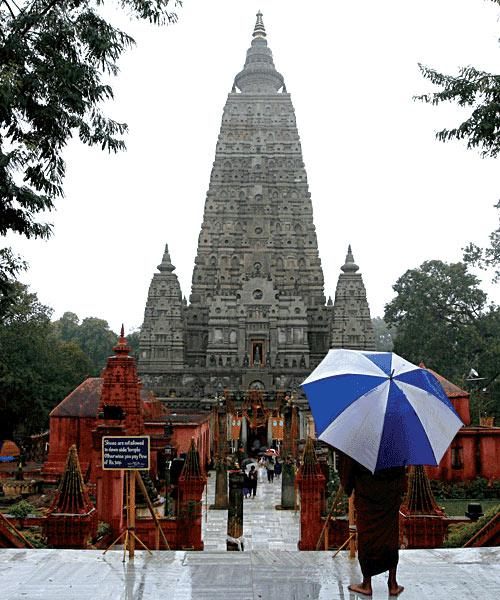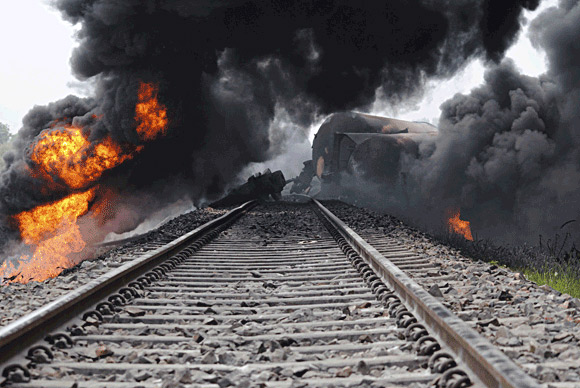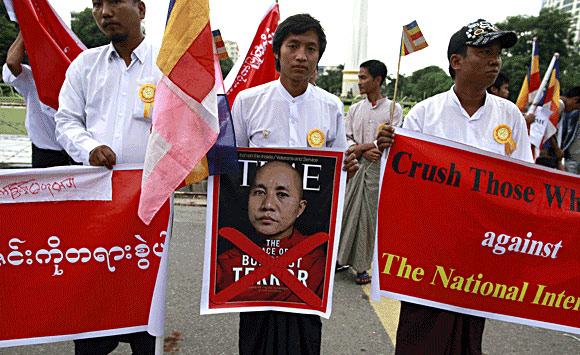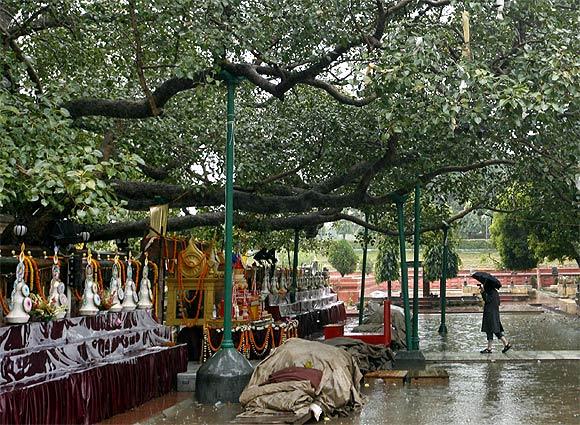 | « Back to article | Print this article |
'Our counter-terrorism effort is still work-in-progress'
Colonel (retd) R Hariharan offers his take on the recent blasts at the Mahabodhi temple in Bodh Gaya.
What is your take on the serial blasts in Bodh Gaya, although the police seem to have had timely alerts before they occurred?
A series of nine explosions rocked the Mahabodhi temple complex in Bodh Gaya, the holiest of all Buddhist sites, in the early hours of July 7. Union Home Minister Sushil Kumar Shinde has confirmed that in all 13 explosive devices were planted in and around the temple complex out of which ten had exploded and the other three were defused. Undoubtedly, this was a terrorist attack carried out by an organised body of terrorists.
According to the police, improvised explosive devices using 2-kg LPG cylinders filled with ammonium nitrate, sulphur and magnesium and sharpnel were used in the explosions. Analogue timers were used to set off the explosions. The number of IEDs planted would indicate more than one person was involved in the attack.
Fortunately, two of the holy sites -- the main temple sanctum, and the Bodhi tree area -- the seat of Buddha’s enlightenment, suffered only minor damage. The giant statue of Buddha that overlooks the worshippers was unscathed. The ineptitude in planting IEDs in close proximity to each other to explode at different timings rendered some of the timers ineffective and saved a huge disaster.
For once neither political leaders nor the media can fault the intelligence agencies which had warned about jihadi terrorist threats to Bodh Gaya on three occasions in October 2012, January 2013 and last month. In fact, the IB had warned of possible attack on Bodh Gaya when it named three suspected terrorists when they entered Bihar.
After receiving the latest alert, Bihar police met with the temple management last week and discussed the security arrangements in the temple complex! Despite all this effort, the terrorists have managed to carry out their task. This showed the gross failure of Bihar police’s security management set up.
The casualness with which the IB alert was treated in Bihar is evident from the explanation given by the state that the temple authorities were managing the security inside the temple and the police were providing protection outside it. And the blasts have exposed the shoddiness of the argument. .
Whatever be the reasons for the failure to prevent the terrorist attack, it once again confirms that our counter-terrorism effort continues to be a never ending 'work in progress' although five years have passed since the 26/11 Lashkar terrorists struck in Mumbai. It is a national shame.
Click NEXT to read further...
'Nitesh has politically managed to keep Maoist extremism on leash'
What were the weaknesses in security management?
Bihar has been the home of some of the notorious Islamist terrorists (according to one report as many as 26 of them belonged to the state). Maoist extremism also had been thriving in this state, though Chief Minister Nitesh Kumar seems to have politically managed to keep it on leash at least for the time being.
In spite of such a background, the Bodh Gaya terrorist attack shows the state government had not taken terrorist threat seriously and nor did the take timely, informed decisions on preventing it. The state has to plan whatever action was required in advance and the state police has to coordinate and rehearse counter terrorism drills involving all stakeholders -- the state and central police and intelligence bodies and civilian security guards. Whatever was done did not stop the terrorists from carrying out their deadly mission.
The fact that terrorists managed to carry 13 IEDs each weighing nearly four kgs in and around the temple complex with impunity showed utter lack of professionalism and poor training of temple security personnel and the police. The temple security personnel did not know how to use the scanners or CCTV.
The chief minister has now asked for the deployment of Central Industrial Security Force for the temple security. However, that is no panacea for preventing future terrorist attacks in the state because the problem is multifaceted. It is the responsibility of the state to provide overall policy guidance and make structural arrangements to facilitate security management. Apparently this is lacking.
On the positive side, there seems to be better sharing of information between state police bodies than before. Similarly the central security and intelligence agencies also appear to be sharing their inputs with state police in time. There is better coordination with the NSG and NIA to investigate the incident after it occurred. This would help in identifying the group involved in the terror strike. Media management was better and kept the information flow to the public on a regular basis.
Click NEXT to read further...
'Monks had been at the forefront of Buddhist extremism'
Do you see this attack as retaliation for attacks on Rohingya Muslims in Myanmar? Or is it an Islamist terrorist backlash to recent escalation in anti-Muslim rhetoric in Myanmar and Sri Lanka by Buddhist activists led by monks?
Taliban extremists’ anti-Buddhist activity has a long history. Even as early as 2001 they destroyed the renowned Bamiyan Buddha statues in Afghanistan. The persecution of Rohingiya Muslims in Myanmar has a long history and it continues with sporadic attacks on them in Rakhine state. The 2012 anti-Rohingya riots left about 140 killed and rendered 100,000 homeless.
This had kindled worldwide protest among Muslims particularly in Pakistan, Malaysia and Indonesia. Even in India in Kolkata and Chennai Muslim organisations held protest marches. Last year, some mischievous elements had in fact triggered mass exodus of people from the northeast working in Chennai and Bengaluru by sending text messages threatening to attack them in retaliation for attacks on Rohingyas!
In addition to this, in Myanmar Buddhist activists have been leading sporadic attacks against local non-Rohingya Muslims also. In March, Buddhist activists killed 43 people and injured 93 in Meikhtila in central Myanmar. In all 1,227 homes, 77 shops and 37 mosques were destroyed. The riots quickly spread to six other townships in Thayawady district in Bago Region in lower Myanmar and to 11 townships in Mandalay and Pegu divisions, where Muslim neighbourhoods were ransacked. And the army had to be called to restore order rather belatedly.
Monks had been at the forefront of such extremism. Monks like Wirathu, leader of the 969 movement, have been delivering provocative sermons against Muslims. This has caused global concerns; even the last issue of Time magazine featured Wirathu on its cover under the caption ‘Buddhist terrorism’.
Jihadi elements have been using the popular sympathy for the oppressed Muslims among the global Muslm community to spread their influence by holding out terror threats against Buddhists. In Pakistan the godfather of the Lashkar-e-Tayiba and Jamaat ud Dawah chief Hafiz Saeed had tweeted on June 14 accusing India of collaborating with Burmese government “wipe out Muslim population of Myanmar.”
He also said it was “an obligation on the whole Muslim Ummah to defend the rights and honour of Rohingya Muslims in Mayanmar” and asked Muslim rulers to “unite and raise their voice for the genocide of Muslims at the UN Security Council."
According to a report in The Express Tribune of Pakistan, Tehreek-e-Taliban Pakistan, popularly known as the Pakistani Taliban, threatened to "attack Burmese interests" if Pakistan did not cut off its diplomatic relations with Myanmar. It threatened to take revenge for the attacks.
Considering these reports and the capability of these terror outfits, it is reasonable to assume Gaya attacks could be part of their retaliation against Buddhists for the Rohingya persecution. However, the process of identifying the perpetrators is going on and it would be too premature to attribute it to any particular terror outfit; but its anti-Indian and anti-Buddhist character is evident.
As far as Sri Lanka is concerned Buddhist activism and vigilantism against Muslims and Christian places worship has been growing for sometime now. Mosques and churches, and even temples have been attacked. The monks have been leading the campaign against halal slaughtering done by Muslims. They have forced closure of shops selling halal meat. This had created panic and unease among Muslims.
Though the government had been neutral, some of the ruling coalition partners like the Jathika Hela Urumaya, right wing monks party, had been supporting these campaigns led by vigilante outfits like Ravana Balaya and the Bodu Bala Sena. At times, at the local level officials tend to ignore the violent activity of the lumpen elements of these outfits or take action belatedly.
However, Sri Lanka Muslims as well as most of the Sinhala leaders have been careful not to allow it to become a full blown Muslim-Buddhist confrontation. And the government also appears to be aware of the dangers of such a confrontation which could have its backlash in Gulf countries where Sri Lankan expatriates work in large numbers. However, in the long term, if these vigilante activities are not curbed by the government the situation could get out of control.
I do not believe Sri Lanka situation has anything to do with the IED attacks in Gaya, though Liberation Tigers of Tamil Eelam had the dubious distinction of carrying out a terror attack on the Temple of the Tooth at Kandy. Despite all the speeches on Tamil Eelam, at present I do not think there is any Tamil outfit, which has either the motivation or capability to carry out an attack on a holy site like Bodh Gaya.
Click NEXT to read further...
'National leadership not strong enough to focus on national priorities'
What is your comment on the politicisation of the attack on Bodh Gaya that appears to be overtaking security concerns?
In India every issue ends up as a political debate. So it is not surprising that a serious security breach that ended in terrorist attack in Bodh Gaya is also meeting the same fate. The reasons for this are many -- inter-party politics and schism, national versus regional jealousies among political outfits, caste and religious ‘vote bank’ politics and historical prejudices etc. We do not have national leadership strong enough to focus on our national priorities. I doubt very much whether we can outlive this.
As a result of this all our hallowed national institutions have been corrupted. The unseemly conduct of the Central Bureau of Investigation in naming the Intelligence Bureau as party in the Ishrat Jahan case is the latest of such dismal episodes. So reports on terrorist activity or suspects do not get the attention they deserve at every level. For example in Kerala, the coalition politics has been leveraged to pamper the minority community and this environment has been cleverly exploited by extremist and divisive elements to increase their clout.
So after every terrorist incident our leaders castigate the ruling party or whitewash their weaknesses. National leaders after Gaya explosions used the same clichés -- ‘cowardly act,’ ‘will not tolerate,’ ‘guilty will be punished’ that have been repeated after every acts of terrorism since 26/11 terror attacks. This is symptomatic of our national weakness: inability to think beyond spouting clichés after the incident rather than getting our act together before they take place.
When P Chidambaram took over as Union home minister in the wake of 26/11 terror strikes in Mumbai he promised to revamp the entire national counter terror effort. He tried to address weaknesses in structural and information sharing systems embedded in the culture of our intelligence agencies and police organisations, particularly at the state level.
The political class has long been accustomed to use the state police to serve their political interest. So it is not surprising Chidambaram’s efforts to professionalise policing and improve the coordination between and among police organisations and intelligence agencies are mired in petty politics and political grandstanding. As we are facing a parliamentary election soon, I do not have much hope of seeing light at the end of the tunnel as it seems unending.
This is a summary of answers given to print and electronic media questions on the serial blasts in Bodh Gaya.
Colonel R Hariharan, a retired Military Intelligence officer, is associated with Chennai Centre for China Studies and the South Asia Analysis Group. E-mail: colhari@yahoo.com; website: www.colhari.org
TOP photo features of the week
Click on MORE to see another set of PHOTO features...




